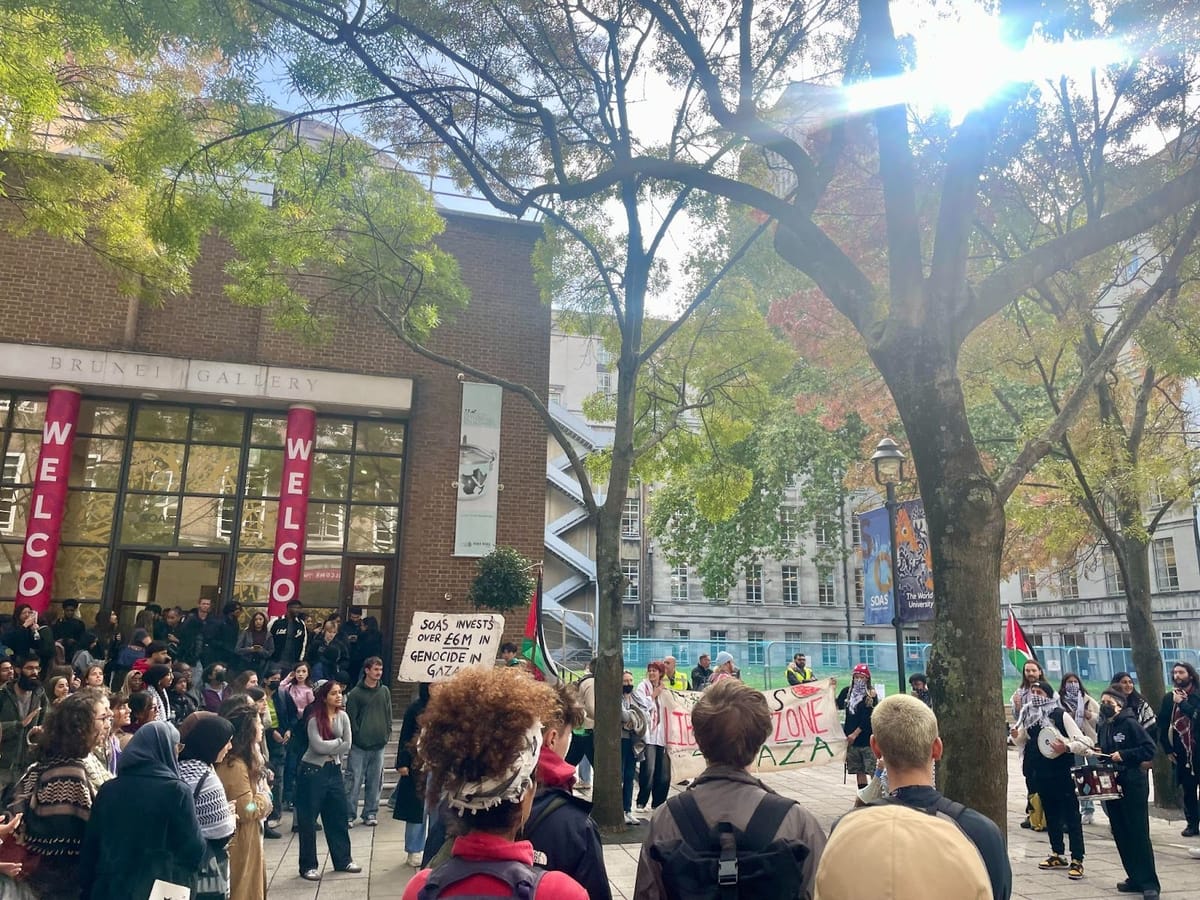FRESHERS FAYRE DISRUPTED BY PROTEST AS STUDENT UNREST CONTINUE
The Freshers’ protest is just a warning of far more action to come if the university continues to ignore its students.

Ella Watharow, MA Middle Eastern Studies 28/10/2023
On 27 September, a protest took place outside the SOAS Main Building during the Freshers Fayre. Members of the SOAS community, as well as a considerable number of students from UCL and other neighbouring universities demonstrated against the SOAS administration and its response to the ongoing conflict in Palestine.
Protesters were swiftly met with a heightened security presence. After 35 minutes, eight additional security guards, four police officers and a police van had arrived on campus. These heightened security measures came following the implementation of an ‘anti-protest’ bill introduced in February. The bill requires protests to be approved by management and security and prohibits criticism of singular individuals within SOAS. Whilst the university cites health and safety concerns as well as the potential for protests to become intimidating, many students view the policy as a suppressive measure against freedom of speech.
Beginning at 4:15pm, the protest coincided with the Freshers Fayre and served to disrupt a key event for both new and returning students, highlighting the ongoing friction between SOAS management and its students. Also in attendance were ex-SU Presidents, Abel Harvie-Clark and Alex Cachinero Gorman. Both were recently debarred from their elected positions following their role in the ‘escalation of tensions with the university as an institution’ and public criticism of SU CEO Irfam Zaman.
The protest was not exclusively attended by members of the SOAS community. The notable presence of students from neighbouring London universities points to a more widespread dissatisfaction amongst students regarding university policies on the Israel-Palestine conflict. A report published on 2 October by UN Human Rights expert Gina Romero recommended that universities ‘revise repressive policies targeting the pro-Palestinian solidarity movement on their campuses’ and ‘refrain from calling on law enforcement to disperse peaceful protest’. The report follows several altercations between student protesters and authorities and the eviction of various Gaza solidarity encampments, including several at London universities such as SOAS, UCL and Queen Mary. The recommendations echo growing concerns over freedom of expression and the right to protest on campus, which have formed the basis of many recent demonstrations including the Freshers Fayre protest.
Abel Harvie-Clark, the recently-dismissed sabbatical officer for Democracy and Education, commented that the Freshers Fayre protest demonstrated that “the SOAS spirit is still alive and kicking”, asserting that “Adam Habib or the SU won't intimidate students into silence - we are all outraged [at] SOAS' ongoing complicity one year into the latest phase of genocide”. He cautioned that “the Freshers’ protest is a warning of far more action to come if the university continues to ignore its students".
Since the Freshers Fayre, the SOAS Liberated Zone for Gaza has led another protest against SOAS’ alleged complicity in the conflict. On 7 October at 12:30 pm, the group staged a mass walkout followed by a demonstration outside the SOAS Main Building, ending with a vigil held outside the Liberated Zone. Among the chants heard in the crowd was ‘Habib must go,’ yet another indication of student dissatisfaction towards the SOAS administration.
Alex Cachinero Gorman, who was dismissed alongside Abel Harvie-Clarke from his role as sabbatical officer of Welfare and Campaigns believes that there are two futures which lie in front of the SU as well as of British universities in general: ‘one in which the same old institutional abuse, intimidation, and silencing only lead to more out-of-court settlements and ruined lives, and one in which it can be at the forefront of change in this city and even this country’.
The recent demonstrations at SOAS are evidence that restrictive measures against protest and criticism on campus have done little to pacify increasing unrest, and if the SOAS administration fails to respond to these growing concerns, the future of the university and its leadership hangs in the balance.



